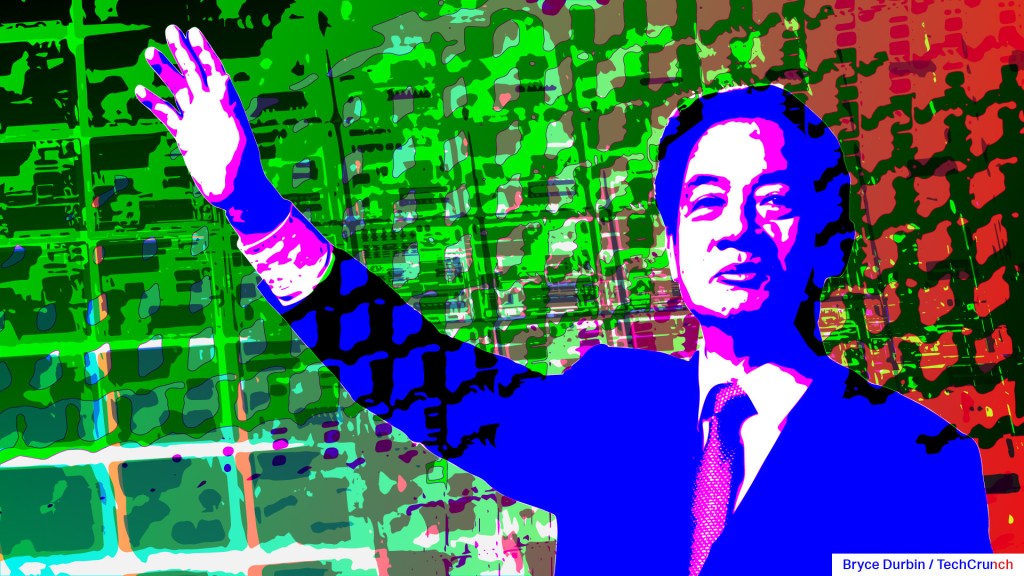Lai Ching-te, who won Taiwan’s presidential election last Saturday, will be facing a crossroads in the country’s technology industry when he takes office in May.
Lai’s administration will be the third term of Democratic Progressive Party rule in Taiwan, and he is widely expected to continue the work of his predecessor, Tsai Ing-wen, when it comes to supporting one of the country’s biggest economic drivers and most valuable exports: its semiconductor industry. But Lai has spoken several times about Taiwan’s chips without laying out specific policies, and he may find himself having to adapt as the industry becomes increasingly vulnerable to geopolitics.
Lai has also pledged to create 20,000 startup jobs within five years, but has given little detail on how he plans to achieve that. Lai made impassioned comments about Taiwan’s chip industry after his victory on Saturday that seem to make it clear that his administration’s main tech focus will be on semiconductors. That makes sense, given their outsized importance to Taiwan and the world’s chip supply chain. For example, TSMC alone accounts for 60% of the world’s foundry capacity. Taiwan’s semiconductor industry strengthens the global standing of the country, a small island with a population of 23 million. And notably, the well-being of Taiwan’s economy is closely intertwined with its semiconductor industry’s performance.
In his acceptance speech Lai said he would “continue to assist the development of the semiconductor industry,” adding that this would also benefit the global economy.
Lai’s mention of Taiwan’s chips was enough to cause a boost in chip stocks. He notably highlighted TSMC’s importance to the world, which Albright Stonebridge Group associate partner and technology policy lead Paul Triolo applauded.
“The big thing was that it was a focus of his speech, and I’ve been arguing this for a long time, which is that Taiwan and TSMC are global assets,” said Triolo.
There’s precedence that Lai is willing to enact policies favorable to the semiconductor industry instead of just speaking in platitudes. While serving as mayor of Tainan in the south of Taiwan, Lai helped establish a TSMC plant in a science park.
But what can Lai actually do for the semiconductor industry? Taiwan has provided TSMC and other companies with tax subsidies and other perks, but it’s starting to lag behind other countries that provide more generous funding and tax breaks. SemiAnalysis chief analyst Dylan Patel said Lai is expected to continue providing chip companies with subsidies and favorable treatment under Taiwan’s environmental protection laws. But at the same time, Taiwan is now playing catch-up with places like the European Union, Japan, South Korea and, of course, China. Patel notes that the U.S. has allocated $52 billion for its chip industry, while China gives semiconductors subsidies for buying tools and apartment buildings for their workers.
In Taiwan, there’s the plus of a lower tax burden, but “that’s about it,” says Patel. “There’s nothing like the U.S. and China have enacted and you’re kind of fighting with your hand tied behind your back” since Taiwan is a small country with a small economy.
Another barrier is that even though the semiconductor industry is important to Taiwan’s economy, most people don’t work in it. Lai has to keep them happy by spending on other domestic issues, especially since he didn’t win by a strong mandate (Lai got 40% in a three-way race with the Kuomintang’s Hou Yu-ih and the Taiwan People’s Party’s Ko Wen-je).
“Most people in the nation are not employed in the semiconductor industry, even though it’s the lifeblood of the economy,” says Patel. “So obviously it’s not going to be popular, especially for the sort of disgruntled people who gave the DPP that margin of victory. I think it’s going to be really hard for them to throw serious money at the semiconductor industry.”
Chris Miller, author of “Chip War: The Fight for the World’s Most Critical Technology,” also thinks that the Taiwanese government is not going to win the perks race.
“It’s very hard to win a subsidy race with the Chinese government, so ideally you wouldn’t go down that path. Taiwan has a much smaller economy, so it’s even harder,” he says. But one benefit Taiwan has is lower costs, not only because of wages, but also because of the way its infrastructure and ecosystem developed.
One way Lai’s administration can help is fostering semiconductor talent. “It’s a mix of education. Do you have the right programs in universities and then have the right internship pathways from university students into companies? And those are two things that governments can focus on,” Miller says.
On the geopolitical front, Lai will deal with a lot when it comes to chips.
“The complication here with Taiwan semiconductors is you have the industry, global supply chain issue and then the geopolitical overlay of the U.S.-China conflict, U.S.-China technology competition, U.S.-China-Taiwan relations,” says Triolo. “To understand all those things together is important. I think Lai is uniquely positioned here because of his background. He seems to really understand this more. He seems to have a very visceral grasp of that because he’s been in positions before supporting the industry.”
In a August 2023 interview with Bloomberg, Lai said he welcomed the expansion of TSMC, which has fabs in Taiwan, the U.S. and China, in other countries, and wouldn’t stop the chipmaker from building more facilities abroad if elected. His reason was that Taiwan’s chip industry has a “responsibility to give back to the international community,” but this can alleviate concerns about the international tech industry’s reliance on TSMC’s Taiwan facilities.
The concentration of chipmaking in Taiwan has become a political issue, both outside and inside Taiwan. Before construction began on the TSMC fab in Arizona, there was controversy as some Taiwanese saw it as an attempt to move Taiwan’s semiconductor industry away from the island.
As the fab gets closer to completion, Triolo says TSMC, and by extension Lai and the Taiwan government might get pressure from the U.S. government to make more advanced nodes in Arizona.
“They’re already working on two nanometers and below, and so there might be a lot of political pressure for TSMC to do at least some advanced node manufacturing and that’s going to be really hard,” he says. Triolo also notes that TSMC’s Arizona fab has run into problems because of cultural differences, finding qualified local contractors and major unexpected cost overruns.
“I think a more valid criticism is does this distract TSMC and does it take a lot of attention,” he says. “Ultimately it’s probably going to be pretty tough to make those facilities profitable and run commercially. I think that’s a more valid criticism than if it’s going to hollow out the industry [in Taiwan], so Lai will have to look at the offshoring of TSMC facilities and decide how much the government wants to allow.”
Supporters of building TSMC fabs in more countries often cite the risks of having most of the world’s chip production in one place, especially when Taiwan is prone to natural disasters like earthquakes and potentially vulnerable to attack from China.
“There’s a lot of sensationalism, but I think the basic concern is valid,” says Miller. “Some of the world’s biggest tech companies like Apple operate on TSMC. There could be a very bad earthquake in Taiwan so I think wanting a more diversified footprint makes a lot of sense.”
The Lai administration also needs to deal with the ongoing decoupling of China and the U.S.’s tech industries, driven in part by U.S. chip sanctions against China. The Taiwanese government has also taken measures like the ones set by its National Security Council to reduce leaks to China about important technologies, including semiconductors.
Miller says China’s chip industry will become stronger because of the amount of money China has invested into its chips industry over the last decade.
“It does have big implications for Taiwanese firms because China has no intention of buying Taiwanese products in places where China can produce comparable technology,” Miller says. “Taiwanese firms need to make sure they’re staying sufficiently ahead of Chinese companies. That’s a challenge because China is a capable economic competitor, so that poses an ongoing challenge for Taiwanese firms in both manufacturing and chip design.”
On the other hand, Patel believes China is still effectively locked out of advanced chips. “Taiwan gets to continue to keep that sort of monopoly they have in the market,” he says.
Despite the challenges faced by Taiwan’s semiconductor industry, Triolo notes that its international recognition has grown significantly since Tsai came into power eight years ago. This was due in part to the semiconductor shortage that started during the pandemic, but also because people became more aware of the industry’s concentration in Taiwan. It was especially important for Lai to speak about Taiwanese semiconductors after winning because of their geopolitical importance.
“It’s not just a local problem. It’s not just an Asia problem,” he says. “It’s of interest to the world. I think that’s really important that he said that in his speech.”































Comment